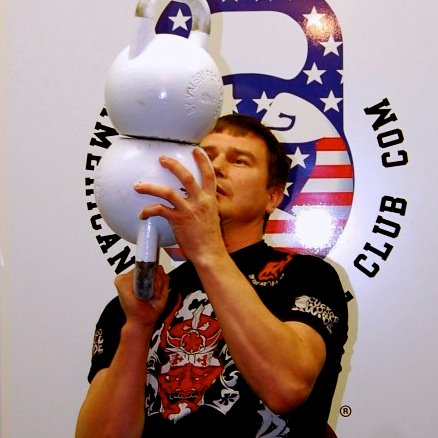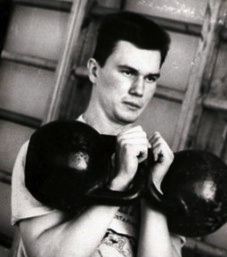Last week I caught up with Valery Fedorenko, and we got talking about competitions.
Now known as the World’s Ambassador to Kettlebells, Valery Fedorenko was born in the Soviet Republic of Kyrgyzstan, and began kettlebell lifting at the age of 12. By the time he was 17 he had already satisfied the required reps for Master of Sport and began his Professional Kettlebell Lifting career. While still a Junior Competitor he broke the all-time 80kg Men’s record in Jerk/Snatch, satisfied the requirements for World Class Master of Sport and became the first 80kg World Champion (1993). Having achieved the Sports highest Rank, Honoured Master of Sport, Valery retired from Competition. I wanted to know what value he now places on competing.
Q: What are the benefits of having a competition as a goal?
A: In every competition you want to do your best, so you have to prepare. This means there will be training and assistance exercises. Before the comp you will be practising your sets over and over. There is a cycle: Prepare, maybe tweak or change your cycle of preparation to get the outcomes you are looking for, go to comp, then you will take a break then start a new cycle of training. This is what a comp creates in your training.
Q: Entering multiple competitions in a short time frame is something I see a lot of among Girevoy Sport athletes. What do you think of this?
A: If you enter 3 challenging comps in a month, and you are looking to beat your personal best, your results are only going to get increasingly worse. You need time to prepare and recover from each large event.
But if this comp is not a big deal for me, if my top score is already 130 reps, then at some small comp I am going to win, don’t need to prepare hardly, not really needing to care about best, could do it as an easy test every week. So it depends on what you want to get out of the competition.
To break a personal record – or world record even – to do a good job you can’t manage it 3 times a month. Once a month is still too much. Every 2-3 months is about perfect.
Q: How should a lifter decide between Biathlon and Long Cycle?
A: When you compete in Biathlon usually it’s 8 months to a year to prepare to compete, but it will only take around 5 months to prepare for Long Cycle. For
Biathlon you need to be in better condition, since it’s a double discipline. If you just go and do Long Cycle, and are already in training for Biathlon, you might only need a week or two to prepare.
However even if you if you prepare 3-4 months for Long Cycle, there’s not enough carryover, and you’re not going to be in a good state for Biathlon. It’s a question of Rack position and grip, and endurance.
For example, I could enter Long Cycle in comp today with 32s, and excel, but I would need one month to get back into position to do as well in Biathlon. Otherwise it would be like training for Biathlon and then entering for a UFC fight instead. There are issues of both technique and endurance to perfect before you are ready to enter.
Q: How do you choose the right competition when there are so many?
A: You can compete anywhere, you just need to learn and respect the different standards: make sure you understand the criteria as they are all different.
The important factors are
– Set the Targets for yourself
– How much are you prepared to spend? How far are you prepared to travel?
– Accept and respect the rules of the meet
Q: What does competing bring to the competitor?
A: To benefit, you need to be hungry for the competition, and ready to learn from results
Twice a year is not enough, you will just lose any mental skills gained from the experience, and you will forget this feeling of tension, adrenalin, and exhilaration
You need to understand when the rep is done, fixation, quality, and strive for movements that promote joint mobility and health
You should want the title, and the credit
You should be driven towards that achievement by the work you’ve invested and your own motivation
4-6 competitions a year is probably the most beneficial target figure, although as many as 8 is still a feasible number, depending on the athlete
Q: What did competing mean to you?
A: I wanted to prove I was the best, that was my reward
The feeling of victory, making history with a new world record
Personally, after a competition I always felt down, the excitement was over
I never entered for the money: I wanted to make my family and friends proud – and maybe annoy my enemies!
I was ambitious too
Q: What is the key to the success of a competition?
A: I am proud to say that the WKC Worlds is proving itself to be a better quality competition.
It is based on organisation, and quality reps, these are what count. The US and Europe are learning fast that quality of reps above number is what determines a good competition. The meet is growing: we had 80 qualified competitors this year
At WKC we don’t want a huge event, we want guys to qualify for the event, so we’re aiming keep it around 100. Currently we allow Rank 3 and above to compete, but I guess we will move these up in the future.
Q: What was the best moment of the year in competition for you?
A: The party and dancing after the Worlds was the best moment for me. The event was plenty of hard work, lots of preparation beforehand and so much to do across the actual event, then when the work was over, everyone could relax, and that was great to see.




